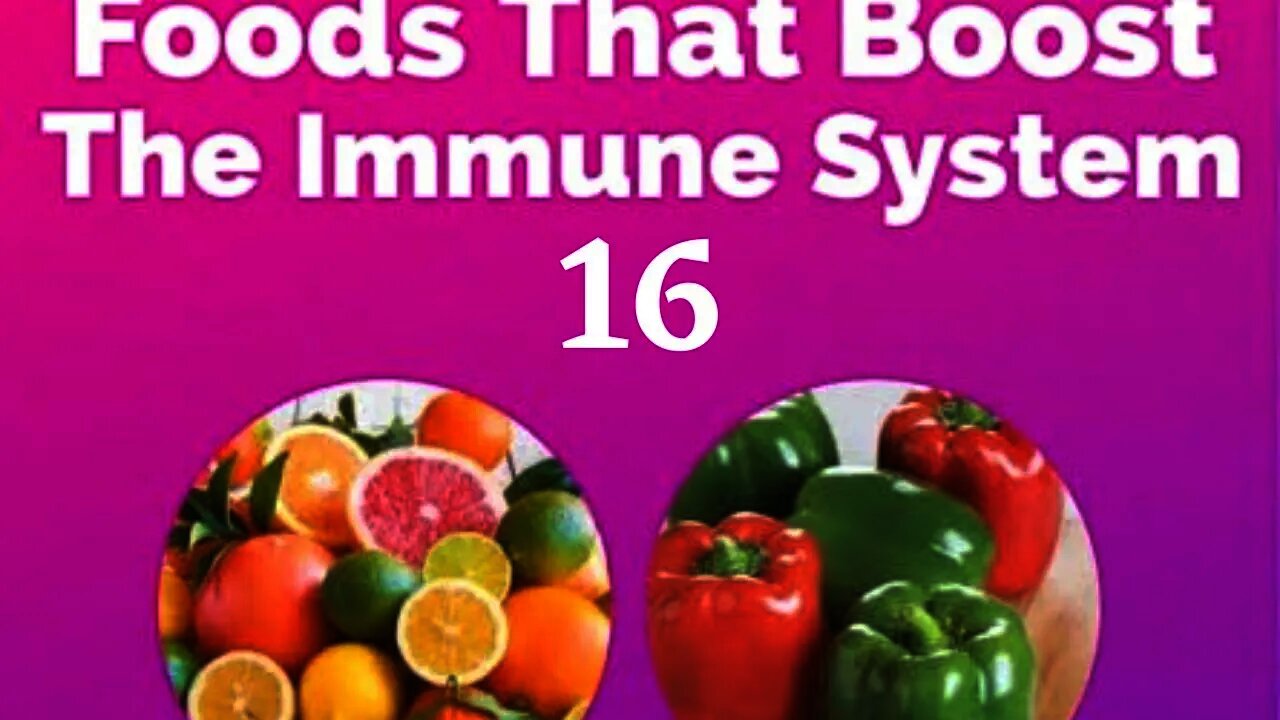Premium Only Content

16 Foods That Boost and Improve Your Immune System
16 Foods That Boost and Improve Your Immune System
1, Reach for Elderberries,
Elderberry is a shrub that has been used medicinally for centuries. Sambucus nigra, or black elderberry bush, is the version most commonly used to make syrup and lozenges. Extracts of elderberry have antiviral, anticancer, and anti-inflammatory properties. Elderberry is also high in flavonoids. People take elderberry syrup as a remedy for colds, flu, and bacterial sinus infections. Plant medicine works by reducing swelling in mucus membranes. Some studies suggest elderberry extract reduces the duration of the flu. If it works for flu infections, it may help your immune system against coronavirus (COVID-19) infection.,
2, Have More Mushrooms,
Wondering how to boost your immune system? Eat more button mushrooms. Mushrooms are high in selenium and B vitamins like riboflavin and niacin. These minerals and vitamins are necessary for the immune system to work in tip-top form. Mushrooms are also high in polysaccharides, sugar-like molecules that boost immune function.,
3, Acai Berry Benefits,
Acai berry is a black-purple fruit that is derived from the acai palm tree in Brazil, Trinidad, and certain parts of South America. The fruit is high in anthocyanins. These flavonoid molecules are very potent antioxidants. They combat oxidative stress in the body by mopping up free radicals. Antioxidants are credited with boosting immunity and lowering inflammation in the body. There’s never been a better time to enjoy an acai bowl!
4, Oysters on the Menu,
Oysters are a nutritional powerhouse from the sea. One 3-ounce serving of Pacific oysters provides 190% of the daily value of selenium, 45% of the daily value of iron, and 20% of the daily value of vitamin C, all for just 140 calories. One 3-ounce serving of oysters contains 16 grams of high-quality protein. The seafood also provides zinc and vitamin A. These vitamins and minerals in oysters are critical for proper immune function.,
5, Pumped About Watermelon,
Watermelon is an immune-boosting fruit. One 2-cup serving of watermelon has 270 mg of potassium, 30% of the daily value of vitamin A, and 25% of the value of vitamin C. Calories in watermelon aren’t much at all. One 2-cup serving of watermelon has just 80 calories. Watermelon also provides vitamin B6 and glutathione. The body needs these vitamins, nutrients, and compounds like glutathione for proper immune function.,
6, Try Some Wheat Germ,
Wheat germ is the innermost part of the wheat kernel. It is the most nutrient-rich part of the grain. The germ is rich in B vitamins, zinc, and vitamin E. Sprinkle wheat germ on top of yogurt or cereal or add it to a shake. Wheat germ makes an easy addition to bump up the nutrition in baked goods. Substitute wheat germ for a bit of white flour in recipes to get some extra vitamins and minerals.,
7, Reasons to Like Low-Fat Yogurt,
Nutrition guidelines recommend adults consume 3 servings of dairy products per day. Low-fat yogurt provides 11 grams of protein, 250 calories, and almost 400 mg of calcium per 8-ounce serving. Low-fat yogurt can also help meet your daily requirement for vitamin B12, vitamin D, and vitamin B2 (riboflavin). Adequate levels of vitamin D and other nutrients are necessary for robust immune function. Yogurt is rich in probiotics, including Lactobacillus acidophilus, Lactobacillus casei, and Bifidus. These strains boost immune function and may even help reduce both the length and severity of colds. Beneficial gut flora is needed for proper digestion, detoxification, and immune function. Probiotics even help reduce eczema symptoms in babies.,
8, Super Spinach,
Spinach gets top billing as a superfood thanks to its high content of folate, vitamin A, vitamin C, fiber, magnesium, and iron. The nutrients in spinach boost immune function and provide the body with necessary nutrients for cell division and DNA repair. Reap maximum benefits from spinach by eating it raw or lightly cooked to preserve nutrients.,
9, Tea Time,
About half the population in the United States drinks tea regularly. Antioxidants in tea called polyphenols and flavonoids are credited with boosting immune function. These compounds may also reduce the risk of heart disease. Drinking green tea favorably affects blood lipids, increasing good HDL cholesterol and decreasing LDL bad cholesterol, triglycerides, and total cholesterol.,
10, Say Yes to Sweet Potatoes,
11, Bring on the Broccoli,
12, Harness the Power of Garlic Cloves,
13, Miso Soup to the Rescue,
14, Chicken Soup for the Cold,
15, Reap the Rewards from Pomegranate Juice,
16, Make Friends with Ginger,
-
 50:18
50:18
JonhTV
3 years ago $0.10 earnedBoost Your Immune System
284 -
 1:34
1:34
WFTX
3 years agoYour Healthy Family: Probiotics boost your immune system
44 -
 15:21
15:21
GritsGG
11 hours ago68 Warzone Win Streak!
151 -
 6:53
6:53
BlabberingCollector
17 hours agoFirst Look At The Dursleys! | Harry Potter HBO Show News
60 -
 2:02:33
2:02:33
Inverted World Live
7 hours agoArea 51 On Fire | Ep. 76
173K20 -
 1:54:05
1:54:05
FreshandFit
5 hours agoYou Will Always Be Cheated On & This Is Why!
35K17 -
 5:16:40
5:16:40
Alex Zedra
6 hours agoLIVE! Playing CoD
49.6K3 -
 2:08:07
2:08:07
PandaSub2000
4 days agoDonkey Kong Bananza | ULTRA BEST AT GAMES (Original Live Version)
22.7K1 -
 59:09
59:09
Man in America
10 hours agoOrder From CHAOS: Epstein, Israel & Ancient Bloodlines w/ Todd Callender
90.5K27 -
 3:07:37
3:07:37
Price of Reason
11 hours agoTrump CANCELS Gavin Newsom's High Speed Train! Can Supergirl SAVE James Gunn Superman? Zelda Casting
15.8K1